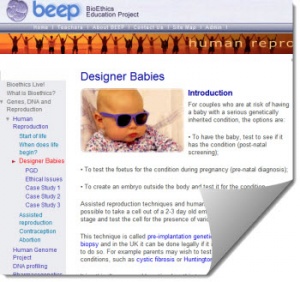Designer Babies: Difference between revisions
mNo edit summary |
No edit summary |
||
| (8 intermediate revisions by 5 users not shown) | |||
| Line 1: | Line 1: | ||
{{ResourcePageGroupMenu|BEEP}} | {{ResourcePageGroupMenu|BEEP}} | ||
{{Rinfo | {{Rinfo | ||
|subject= | |type= Lesson idea | ||
|attribution={{Jocelyn Wishart}} | |||
|subject=Science | |||
|resourcenumber= SC0015 | |resourcenumber= SC0015 | ||
|age= | |age= KS5, Secondary | ||
|title= Designer Babies | |title= Designer Babies | ||
|topic=Ethics | |topic=Ethics, Fertility treatments | ||
|tagline= | |tagline=When does life actually begin? | ||
|image=Designerbabies1.jpg | |image=Designerbabies1.jpg | ||
|content=Technical advances develop faster than people can discuss its implications. Stories about surrogate mothers, designer babies, older parents, embryo mix-ups appear frequently in the media | |content=Technical advances develop faster than people can discuss its implications. Stories about surrogate mothers, designer babies, older parents, embryo mix-ups appear frequently in the media and raise new ethical dilemmas. This tutorial looks at why reproduction, including 'designer babies' raises ethical issues. The resource features a web tutorial with a page that can be used as an answer sheet. | ||
|format=Web tutorial with a page (.doc) to guide students | |format=Web tutorial with a page (.doc) to guide students | ||
|strategy= | |strategy= | ||
| Line 15: | Line 17: | ||
|additional resources= http://www.beep.ac.uk/content/110.0.html | |additional resources= http://www.beep.ac.uk/content/110.0.html | ||
|useful information= | |useful information= | ||
|related resources=[[Cloning]], [[Ethical issues in human reproduction]] [[Group_Talk_and_Argument]] | |related resources=[[Cloning]], [[Ethical issues in human reproduction]] and [[Group_Talk_and_Argument]] | ||
|other= | |other= | ||
|resources= | |resources= | ||
* | * Lesson idea: http://www.beep.ac.uk/content/352.0.html | ||
* | * 'Teaching Argument' section: http://www.beep.ac.uk/content/282.0.html | ||
[[File:Designerbabies2.jpg|border|250x250px|link=|Preview]] | [[File:Designerbabies2.jpg|border|250x250px|link=|Preview]] | ||
|final=yes | |||
}} | }} | ||
[[Category:Secondary]][[Category:Science | [[Category:Secondary]][[Category:Science]][[Category:Contemporary issues]][[Category:Argumentation]] | ||
Latest revision as of 19:44, 31 January 2015
Lesson idea. Technical advances develop faster than people can discuss its implications. Stories about surrogate mothers, designer babies, older parents, embryo mix-ups appear frequently in the media and raise new ethical dilemmas. This tutorial looks at why reproduction, including 'designer babies' raises ethical issues. The resource features a web tutorial with a page that can be used as an answer sheet.
Teaching approach. By using an informative web tutorial, this resource aims to stimulate discussion(ta) on the ethics(topic) of modern biology. A worksheet asks students where they stand and reassures them that their response might be kept private. You might also consider using a blog, chat room or other ICT tool to record the questioning(ta) and reasoning(ta) around this topic. A teaching section offers guidance on 'teaching argument' using 'Toulmin’s model of argument' and 'The IDEAS project'. (edit)
| Resource details | |
| Title | Designer Babies |
| Topic | [[Topics/Ethics|Ethics]], [[Topics/Fertility treatments|Fertility treatments]] |
| Teaching approach | [[Teaching Approaches/Questioning|Questioning]], [[Teaching Approaches/Reasoning|Reasoning]], [[Teaching Approaches/Discussion|Discussion]] |
| Learning Objectives | not defined here |
| Format / structure | Web tutorial with a page (.doc) to guide students |
| Subject | [[Resources/Science|Science]] |
| Age of students / grade | [[Resources/KS5|KS5]], [[Resources/Secondary|Secondary]] |
| Additional Resources/material needed | |
| Related ORBIT Wiki Resources | |
| Files and resources to view and download |
|


